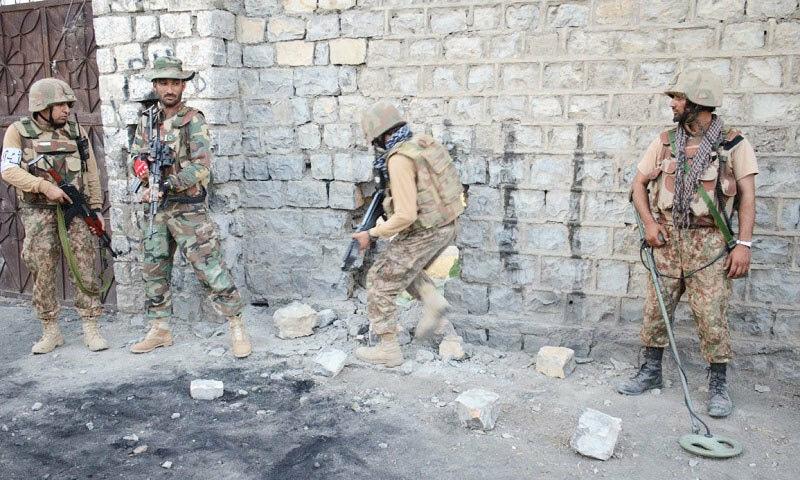There are various factors that contribute to the problem of terrorism in Balochistan, the role of foreign actors in fueling terrorism in Balochistan cannot be ignored. The southwestern province of Balochistan in Pakistan has been grappling with a variety of challenges, including political instability, underdevelopment, poverty, and violence. One of the most significant issues facing the province is terrorism, which has plagued the region for decades. Despite concerted efforts by the Pakistani state to address the problem, terrorism in Balochistan continues to persist, with devastating consequences for the region’s people and economy.
Security and law enforcement agencies have recently taken successful action against the Balochistan Liberation Front (BLF) propaganda on social media. The BLF had been trying to portray the alleged suicide bomber Mahal Baloch as a missing person. However, the Counter Terrorism Department (CTD) arrested the woman suicide bomber from Satellite Town Ladies Park in Quetta, and a suicide jacket with explosive material was recovered from her handbag.
Sources in the security department have revealed that Bebagar Baloch, also known as Nadeem, the husband of the accused female suicide bomber Mahal Baloch, was associated with the military wing of the BLF. Her father-in-law, Master Muhammad Hussain, was related to the central committee of Baloch National Movement (BNM). Bebagar Baloch and his brother were among the closest associates of BLF commanders, including Wahid Bakhsh Qambar, Founder of BLF Dr. Allah Nazar, Dilip Shikhari, and the Baloch National Movement (BNM) Chairman Ghulam Nabi Hebtan. In 2016, Bebagar and his brother Noqb were killed as a result of a fight between them over money and weapons.
Mahal’s sister was also married to Yusuf, the nephew of Dr. Allah Nazar, who was the chairman of the Baloch rights organization. She was influenced to support the military wing of the BLF.
The sources are questioning why Baloch mothers and sisters are being used by the enemy for their nefarious purposes. They are calling out the so-called freedom organizations for making women a part of this hideous and dangerous game of anti-nationalism.
Baloch people are a proud nation, and it goes against Balochi culture to separate a woman from her children and encourage her to become a suicide bomber. A Baloch can never use their honour for money. The nefarious designs of the enemy have been exposed, and no mother will be allowed to be separated from her children and made a suicide bomber.
The BLF attempted to propagate false information on social media to hide its heinous face, but it failed. The picture and narrative shared by the BLF on Twitter, using the handle “The Balochistan Post,” were exposed before the people of Pakistan.
While various factors contribute to the problem of terrorism in Balochistan, the role of foreign actors cannot be ignored. There are persistent allegations that external actors are actively involved in fueling terrorism in the region, either through providing financial, military, and logistical support to terrorist groups or through using their influence to stoke tensions between different groups.
The province of Balochistan in Pakistan has been a site of political unrest and terrorism for several decades. Many factors have contributed to this instability, including the historical neglect of the region by the Pakistani government, economic underdevelopment, and a complex web of tribal and ethnic rivalries. However, one factor that has received significant attention in recent years is the role of foreign actors in fueling terrorism in Balochistan.
Foreign involvement in Balochistan is not a new phenomenon. India has long been accused by the Pakistani government of supporting Baloch separatists as a means of destabilizing Pakistan. Iran is also believed to have supported Baloch militants at various times in the past, and some analysts have suggested that the United States may have played a role in the past as well [2]. However, the involvement of foreign actors in Balochistan has become a particularly pressing issue in recent years due to the expansion of the China-Pakistan Economic Corridor (CPEC), a large infrastructure and investment project led by China.
The CPEC is a central part of China’s ambitious Belt and Road Initiative, which aims to create a network of trade and infrastructure across Asia, Europe, and Africa. Balochistan is a key component of the CPEC, as it is home to the port of Gwadar, which is a crucial hub for trade between China and the Middle East. However, the CPEC has been controversial in Pakistan due to concerns about Chinese economic dominance and the potential for the project to exacerbate existing ethnic and economic tensions.
Many analysts believe that foreign actors, particularly India and the United States, may be seeking to use Balochistan as a means of undermining the CPEC and weakening China’s influence in the region [5]. These actors may be providing support to Baloch separatist groups, such as the Baloch Liberation Army (BLA), which have been responsible for a number of high-profile attacks on Pakistani security forces and Chinese workers in recent years.
The involvement of foreign actors in Balochistan has made it more difficult for the Pakistani government to address the issue of terrorism in the province. Some have suggested that Pakistan may need to adopt a more nuanced approach to the issue, such as engaging in dialogue with moderate Baloch separatists or working to address the economic grievances of the Baloch people. However, others argue that the government needs to take a more aggressive approach, such as cracking down on militant groups and increasing security measures in the province.
Overall, the role of foreign actors in fueling terrorism in Balochistan is a complex and multifaceted issue. It is likely that a combination of domestic and international factors, including economic underdevelopment, ethnic tensions, and foreign interference, have contributed to the instability in the region. Addressing this issue will require a comprehensive and nuanced approach that takes into account the concerns and grievances of all parties involved.


